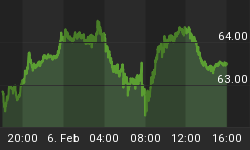Last week-end we observed that market internals are weakening. Two days later the SP500 registered its lowest low and found support just above the 1340 level. This happens to be the 23.6% retracement level of the October '11 - April '12 rally:

Chart courtesy of OT Fibonacci app
Trees don't grow up to the sky, and a period of consolidation after a prolonged rally is the healthy thing for the market to do. A retracement level of the current magnitude should not, by itself, be a reason for panic among long-term trend traders. 1340 also happens to be the retracement level of the last correction of the December '11 - April '12 upleg, and as long as the index doesn't break below that number, even the wave structure remains intact.
The decline last week, however, led to deterioration of the technical picture. Both the daily and weekly trends turned down, and the index remains below the pivot line at 1357, with first channel support at 1329 (as calculated by OddsTrader):

The ramifications are that in a downtrend traders should be selling rallies, while in an uptrend they should be buying pullbacks. What distinguishes the OddsTrader risk/reward oscillator (bottom of the chart above) from traditional oscillators is that it will remain oversold in an uptrend, and overbought in a downtrend, thus identifying opportunities to stay and trade with the trend.
This brief analysis wouldn't be complete without a look at the Trend Oscillator, which measures the deviation of price from the underlying trend. By that measure, the SPX price currently is in sync with the declining trend and hasn't reached oversold or overbought levels yet:

Chart courtesy of OT Trend
In summary, the SPX remains in a consolidation zone. A break above 1360 will open up the possibility for a run up to previous highs, while a break below 1340 will confirm the downtrend and put in play support levels at 1329, 1321 and 1315.















